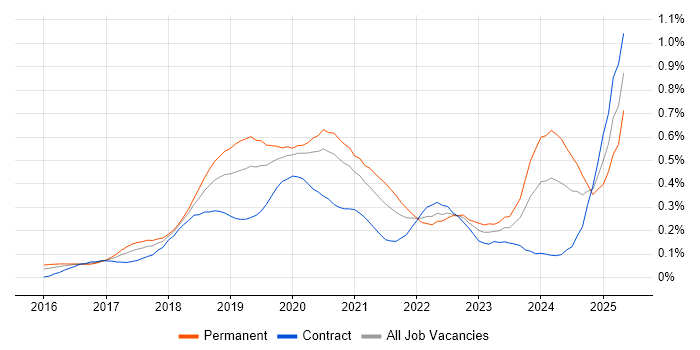Google TensorFlow
Central London > City of London
The table below provides summary statistics for permanent job vacancies advertised in the City of London requiring TensorFlow skills. It includes a benchmarking guide to the annual salaries offered in vacancies that cited TensorFlow over the 6 months leading up to 28 May 2025, comparing them to the same period in the previous two years.
| 6 months to 28 May 2025 |
Same period 2024 | Same period 2023 | |
|---|---|---|---|
| Rank | 130 | 147 | 225 |
| Rank change year-on-year | +17 | +78 | +55 |
| Permanent jobs citing TensorFlow | 9 | 30 | 6 |
| As % of all permanent jobs advertised in the City of London | 0.47% | 0.90% | 0.13% |
| As % of the Libraries, Frameworks & Software Standards category | 1.55% | 3.49% | 0.38% |
| Number of salaries quoted | 5 | 7 | 6 |
| 10th Percentile | £77,750 | £45,750 | £54,375 |
| 25th Percentile | £80,000 | £51,625 | £65,000 |
| Median annual salary (50th Percentile) | £85,000 | £75,000 | £75,000 |
| Median % change year-on-year | +13.33% | - | +20.00% |
| 75th Percentile | £90,000 | £80,250 | £85,000 |
| 90th Percentile | £97,500 | £108,800 | £96,250 |
| Central London median annual salary | £85,000 | £75,000 | £75,000 |
| % change year-on-year | +13.33% | - | +20.00% |
All Software Libraries and Frameworks
City of London
TensorFlow falls under the Software Libraries and Frameworks category. For comparison with the information above, the following table provides summary statistics for all permanent job vacancies requiring technical specification, industry standards, software libraries and framework skills in the City of London.
| Permanent vacancies with a requirement for technical specification, industry standards, software libraries and framework skills | 579 | 859 | 1,560 |
| As % of all permanent jobs advertised in the City of London | 30.31% | 25.70% | 34.24% |
| Number of salaries quoted | 481 | 696 | 1,371 |
| 10th Percentile | £47,500 | £46,250 | £51,250 |
| 25th Percentile | £58,750 | £60,000 | £62,500 |
| Median annual salary (50th Percentile) | £77,500 | £77,500 | £80,000 |
| Median % change year-on-year | - | -3.13% | +3.23% |
| 75th Percentile | £105,000 | £100,000 | £102,500 |
| 90th Percentile | £117,750 | £118,000 | £117,500 |
| Central London median annual salary | £80,000 | £75,000 | £80,000 |
| % change year-on-year | +6.67% | -6.25% | +3.23% |
TensorFlow
Job Vacancy Trend in the City of London
Job postings citing TensorFlow as a proportion of all IT jobs advertised in the City of London.

TensorFlow
Salary Trend in the City of London
3-month moving average salary quoted in jobs citing TensorFlow in the City of London.
TensorFlow
Salary Histogram in the City of London
Salary distribution for jobs citing TensorFlow in the City of London over the 6 months to 28 May 2025.
TensorFlow
Co-occurring Skills and Capabilities in the City of London by Category
The follow tables expand on the table above by listing co-occurrences grouped by category. The same employment type, locality and period is covered with up to 20 co-occurrences shown in each of the following categories:
